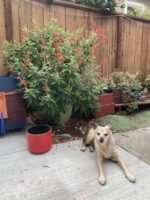Key Takeaways
Pineapple Sage is non-toxic to both cats and dogs, making it a safe addition to pet-friendly gardens.
While not toxic, large amounts of Pineapple Sage can cause mild gastrointestinal upset in pets.
Pineapple Sage can be safely consumed by rabbits in moderation.
It is important to monitor your pets for any signs of discomfort if they consume Pineapple Sage. For more information on safe plants, see why rosemary is not toxic to dogs or cats.
Alternative pet-safe plants include catnip, rosemary, and thyme.
Is Pineapple Sage Toxic or Safe
When it comes to ensuring the safety of our furry friends, it’s essential to know which plants are safe and which ones are not. Pineapple Sage, or Salvia elegans, often sparks curiosity among pet owners. Is it safe? Can it harm your beloved pets? Let’s delve into the details. For more information, check out this article on whether pineapple sage is safe for dogs and cats.
The Safety of Pineapple Sage for Pets
Pineapple Sage is widely recognized as non-toxic to cats and dogs. This means that if your pet happens to nibble on this plant, there’s no immediate cause for alarm. However, it’s crucial to understand that non-toxic doesn’t necessarily mean completely harmless. For instance, other plants like rosemary are also non-toxic to pets but should still be consumed in moderation.
Even non-toxic plants can cause mild gastrointestinal upset if consumed in large quantities. Therefore, while Pineapple Sage is generally safe, it’s best to keep an eye on your pets and ensure they don’t overindulge.
Pineapple Sage Overview
Scientific Name and Basic Characteristics
Pineapple Sage, scientifically known as Salvia elegans, is a perennial herb that belongs to the mint family. It’s named for its sweet pineapple scent, which is particularly noticeable when the leaves are crushed. This plant is not only popular for its fragrance but also for its vibrant red flowers, which attract hummingbirds and butterflies.
Habitat and Growth Conditions
Pineapple Sage thrives in warm climates and prefers well-drained soil. It can be grown in garden beds or containers, making it a versatile choice for many gardeners. This plant requires full sun to partial shade and regular watering to flourish.
“Pineapple Sage is one of our favorite flowering plants that are safe for dogs, cats, and horses.” – Lovie’s Pet Safe Garden
Given its non-toxic nature and attractive appearance, Pineapple Sage is an excellent addition to pet-friendly gardens. However, always ensure that your pets have a balanced diet and don’t rely on plants as their primary food source. For more tips on creating a pet-safe garden, check out our guide on growing chicory in pet-friendly container gardens.
Safety for Cats and Dogs

Non-Toxicity Information
According to multiple sources, including the ASPCA, Pineapple Sage is not listed as a toxic plant for cats or dogs. This makes it a safe option for pet owners who want to add some greenery to their homes without risking their pets’ health. For more information on other pet-safe plants, check out this article on growing chicory in pet-friendly gardens.
However, it’s important to note that while Pineapple Sage is non-toxic, any plant can potentially cause mild gastrointestinal upset if consumed in large amounts. Symptoms to watch for include vomiting and diarrhea. If you notice these signs, it’s best to consult your veterinarian for advice. For more information on safe plants, check out why rosemary is not toxic to dogs or cats.
Potential Symptoms if Ingested
While Pineapple Sage is generally safe, it’s always good to be cautious. If your pet consumes a significant amount of Pineapple Sage, they might experience mild gastrointestinal upset. Symptoms to watch for include:
- Vomiting
- Diarrhea
- Loss of appetite
Most importantly, if you observe any of these symptoms, monitor your pet closely. Usually, these symptoms are mild and resolve on their own. However, if they persist, it’s best to seek veterinary advice.
Precautionary Measures for Pet Owners
While Pineapple Sage is non-toxic, it’s always wise to take precautionary measures to ensure your pets’ safety:
- Monitor your pets when they are around plants.
- Provide a balanced diet to reduce the likelihood of them eating plants.
- Keep a list of toxic and non-toxic plants handy for quick reference.
By following these simple steps, you can create a safe and enjoyable environment for your pets and plants to coexist. For more information on pet-safe plants, check out our guide on rosemary safety for dogs and cats.
Non-Toxicity Information
Pineapple Sage, known scientifically as Salvia elegans, is classified as non-toxic to both cats and dogs. This means that if your curious pet decides to munch on some leaves, there’s no need to rush them to the vet. The American Society for the Prevention of Cruelty to Animals (ASPCA) lists Pineapple Sage as a safe plant, which should give pet owners peace of mind.
However, even non-toxic plants can cause minor issues if consumed in large quantities. While Pineapple Sage won’t poison your pets, it’s always a good idea to monitor their plant consumption to avoid any potential discomfort. For more information on safe plants, check out Texas Sage and its safety for pets.
Potential Symptoms if Ingested
While Pineapple Sage is not toxic, it can still cause mild gastrointestinal upset if ingested in large amounts. If your pet eats too much of this plant, you might notice symptoms such as:
For more information on non-toxic plants, you can read about how Texas Sage is not toxic to pets.
- Vomiting
- Diarrhea
- Loss of appetite
These symptoms are usually mild and temporary. Most pets will recover without any medical intervention. However, if the symptoms persist or worsen, it’s best to consult your veterinarian for further advice.
Precautionary Measures for Pet Owners
To ensure your pets stay safe around Pineapple Sage, here are some precautionary measures you can take:
- Supervise your pets when they are in the garden or around houseplants.
- Provide plenty of toys and other distractions to keep them from chewing on plants.
- Ensure your pets have a balanced diet, reducing their need to seek out additional foliage.
- Keep a list of pet-safe plants handy for reference when adding new plants to your home or garden.
By following these steps, you can create a safe environment where your pets and plants can coexist harmoniously.
Impact on Other Pets
Besides cats and dogs, Pineapple Sage’s safety extends to other common pets. Let’s explore its effects on animals like rabbits and horses.
Can Rabbits Eat Pineapple Sage Raw?
Rabbits can safely consume Pineapple Sage, but as with any plant, moderation is key. Pineapple Sage can be a delightful treat for rabbits due to its aromatic leaves and flowers. However, it’s essential to introduce any new plant slowly into a rabbit’s diet to avoid digestive issues.
Always ensure that your rabbit’s primary diet consists of hay, fresh vegetables, and a small number of pellets. Pineapple Sage should be an occasional treat rather than a staple in their diet.
Safety for Horses and Other Animals
Pineapple Sage is also safe for larger animals like horses. In fact, many pet-safe gardens include Pineapple Sage as a colorful and fragrant addition that poses no threat to grazing animals. Horses, much like other pets, should consume this plant in moderation to avoid any gastrointestinal upset.
It’s always a good practice to consult with a veterinarian before introducing any new plants into your animals’ diet, especially if they have known sensitivities or health conditions.
Growing Pineapple Sage in a Pet-Safe Garden
Creating a pet-safe garden involves careful planning and plant selection. Pineapple Sage can be a wonderful addition, thanks to its non-toxic nature and vibrant appearance.
Best Practices for Placement
When adding Pineapple Sage to your garden, consider placing it in areas where your pets can enjoy its scent and beauty without overindulging. For more information on whether Pineapple Sage is toxic to cats, here are some tips for placement:
- Plant Pineapple Sage in raised beds or containers to control access.
- Mix it with other pet-safe plants to create a diverse and stimulating environment.
- Ensure it receives full sun to partial shade for optimal growth.
By strategically placing Pineapple Sage, you can enhance your garden’s aesthetic while keeping your pets safe.
Maintenance Tips
Pineapple Sage is relatively easy to maintain, making it a great choice for busy pet owners. Here are some maintenance tips:
- Water regularly, ensuring the soil remains moist but not waterlogged.
- Prune the plant to encourage bushy growth and remove any dead or damaged leaves.
- Fertilize with a balanced, all-purpose fertilizer during the growing season.
With proper care, Pineapple Sage can thrive and provide a safe, fragrant addition to your garden.
Propagating Pineapple Sage Safely
Propagating Pineapple Sage is straightforward and can be done through cuttings or seeds. Here’s a simple method for propagation:
- Take a cutting from a healthy Pineapple Sage plant, about 4-6 inches long.
- Remove the lower leaves and dip the cut end in rooting hormone.
- Plant the cutting in a pot filled with well-draining soil and water thoroughly.
- Place the pot in a warm, sunny location and keep the soil moist.
With these steps, you can easily propagate Pineapple Sage and expand your pet-safe garden.
Alternatives to Pineapple Sage
If you’re looking for other pet-safe plants to complement Pineapple Sage, there are plenty of options. These alternatives can add variety and ensure a safe environment for your pets.
Other Cat-Safe Herbs
For cat owners, several herbs are known to be safe and even beneficial for felines. Consider adding these to your garden, and learn more about pineapple sage and its safety for cats.
- Catnip
- Thyme
- Parsley
- Valerian
These herbs not only provide a safe environment but also offer sensory enrichment for your cats.
Dog-Friendly Plants for Your Garden
Dogs can also benefit from a variety of non-toxic plants. Here are some dog-friendly options:
- Rosemary
- Basil
- Marigolds
- Snapdragons
Including these plants in your garden can create a stimulating and safe space for your canine companions.
Rabbit-Safe Plants You Can Easily Grow Yourself
Rabbits enjoy a range of plants that are safe and nutritious. Consider these options: Texas sage.
- Dandelion greens
- Mint
- Cilantro
- Lavender
These plants can provide a tasty and safe treat for your rabbits while enhancing your garden’s diversity. For more ideas on pet-friendly gardening, check out this guide on growing chicory in pet-friendly container gardens.
Final Thoughts on Pineapple Sage
In summary, Pineapple Sage is a safe and beautiful addition to any pet-friendly garden. Its non-toxic nature ensures that your pets can explore and enjoy the garden without risk. However, always monitor your pets and introduce any new plants gradually to avoid any potential issues.
Summary of Key Points
Pineapple Sage is non-toxic to cats, dogs, and other common pets like rabbits and horses. While it can cause mild gastrointestinal upset if consumed in large amounts, it’s generally safe. By following precautionary measures and considering alternative pet-safe plants, you can create a harmonious and safe environment for your pets and plants.
Recommendations for Pet Owners
For pet owners looking to create a safe and enjoyable garden, consider the following recommendations:
- Choose non-toxic plants like Pineapple Sage and other pet-safe alternatives.
- Monitor your pets’ interactions with plants to prevent overconsumption.
- Provide a balanced diet and plenty of enrichment to reduce the likelihood of plant consumption.
- Consult your veterinarian if you have any concerns about your pets’ health or plant choices.
By following these guidelines, you can ensure a safe and beautiful garden that both you and your pets can enjoy. For instance, you might consider Texas Sage as another non-toxic option for your garden.
Frequently Asked Questions (FAQ)
Is Pineapple Sage completely safe for all pets?
Yes, Pineapple Sage is generally safe for cats, dogs, rabbits, and horses. However, always monitor your pets to ensure they don’t consume large amounts, which can cause mild gastrointestinal upset. For more information on pet-safe plants, you can check out this article on rosemary safety for pets.
What symptoms should I watch for if my pet eats too much Pineapple Sage?
If your pet consumes a large amount of Pineapple Sage, watch for symptoms like vomiting, diarrhea, and loss of appetite. These symptoms are usually mild and temporary, but consult your veterinarian if they persist.
Are there specific benefits of Pineapple Sage to pets or people?
While Pineapple Sage is primarily known for its non-toxic nature and pleasant fragrance, it can also provide sensory enrichment for pets. For people, Pineapple Sage is often used in teas and culinary dishes for its unique flavor.
Option B: There is a relevant link that can be added to the paragraph in Step 2. Here is the modified version:
Rabbit-safe Plants You Can Easily Grow Yourself
Rabbits enjoy a range of plants that are safe and nutritious. Consider these options, such as growing chicory in your garden.
- Dandelion greens
- Mint
- Cilantro
- Lavender
These plants can provide a tasty and safe treat for your rabbits while enhancing your garden’s diversity.
Final Thoughts on Pineapple Sage
In summary, Pineapple Sage is a safe and beautiful addition to any pet-friendly garden. Its non-toxic nature ensures that your pets can explore and enjoy the garden without risk. However, always monitor your pets and introduce any new plants gradually to avoid any potential issues. For more information on its safety, you can check out this detailed guide on Pineapple Sage.
While Pineapple Sage is generally safe, it’s always good to be cautious. If your pet consumes a significant amount of Pineapple Sage, they might experience mild gastrointestinal upset. Symptoms to watch for include vomiting, diarrhea, and loss of appetite. Most importantly, if you observe any of these symptoms, monitor your pet closely. Usually, these symptoms are mild and resolve on their own. However, if they persist, it’s best to seek veterinary advice.
To ensure your pets stay safe around Pineapple Sage, here are some precautionary measures you can take: Supervise your pets when they are in the garden or around houseplants. Provide plenty of toys and other distractions to keep them from chewing on plants. Ensure your pets have a balanced diet, reducing their need to seek out additional foliage. Keep a list of pet-safe plants handy for reference when adding new plants to your home or garden. By following these steps, you can create a safe environment where your pets and plants can coexist harmoniously.
Summary of Key Points
Pineapple Sage is non-toxic to cats, dogs, and other common pets like rabbits and horses. While it can cause mild gastrointestinal upset if consumed in large amounts, it’s generally safe. By following precautionary measures and considering alternative pet-safe plants, you can create a harmonious and safe environment for your pets and plants.
Pineapple Sage, known scientifically as Salvia elegans, is classified as non-toxic to both cats and dogs. This means that if your curious pet decides to munch on some leaves, there’s no need to rush them to the vet. The American Society for the Prevention of Cruelty to Animals (ASPCA) lists Pineapple Sage as a safe plant, which should give pet owners peace of mind. However, even non-toxic plants can cause minor issues if consumed in large quantities. While Pineapple Sage won’t poison your pets, it’s always a good idea to monitor their plant consumption to avoid any potential discomfort.
While Pineapple Sage is not toxic, it can still cause mild gastrointestinal upset if ingested in large amounts. If your pet eats too much of this plant, you might notice symptoms such as vomiting, diarrhea, and loss of appetite. These symptoms are usually mild and temporary. Most pets will recover without any medical intervention. However, if the symptoms persist or worsen, it’s best to consult your veterinarian for further advice. For more information, you can check out this guide on Pineapple Sage safety for pets.
Recommendations for Pet Owners
For pet owners looking to create a safe and enjoyable garden, consider the following recommendations:
- Choose non-toxic plants like Pineapple Sage and other pet-safe alternatives.
- Monitor your pets’ interactions with plants to prevent overconsumption.
- Provide a balanced diet and plenty of enrichment to reduce the likelihood of plant consumption.
- Consult your veterinarian if you have any concerns about your pets’ health or plant choices.
By following these guidelines, you can ensure a safe and beautiful garden that both you and your pets can enjoy.





